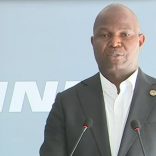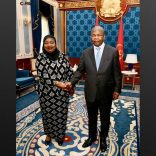Mozambique, World Bank partnership gains momentum as President Chapo meets Ajay Banga in ...
Mozambique: IMF rejects request on debt sustainability analysis

The security panel brought together Abebe Aemro Selassie, Director of the International Monetary Fund’s Africa Department, Dr. Jean-Claude Kassi Brou, President of the Commission of the Economic Community of West Africa States (ECOWAS), and Adriano Afonso Maleiane, Mozambique’s Minister of Economy and Finance. [ Screen grab: AfDB]
The International Monetary Fund (IMF) on Tuesday rejected a request by Mozambique that the debt incurred under the issue of specific bonds for countries in military conflict should not count towards debt ratios.
“My first reaction, conceptually, is that if the instrument creates debt and risk, it has to be treated as such, and not to be seen that way is to try to cover up the debt and not face reality,” the director of the IMF’s African department responded to Mozambique’s finance minister’s explicit question at the fourth Africa Resilience Forum during the panel on “‘The Security, Economic Growth, and Investment Nexus: Solutions for Mitigating Vulnerability and Fragility”‘.
“We help by finding other forms of financing, grants and more types of concessional loans, and we have to see the advantages and disadvantages between this instrument and alternative forms of financing,” added Abebe Aemro Selassie.
In question is a financing instrument that the African Development Bank (AfDB) is preparing, which involves issuing debt specifically to countries affected by conflicts, as is the case of Mozambique, so that they can finance themselves to re-launch the economies, particularly in the worst affected regions.
By financing themselves through this instrument, which will have lower interest rates than usual and more extended payment periods, the countries will increase their debt, jeopardising the Debt Sustainability Assessment (DSA).
This analysis comprises five indicators (Present Value of Debt compared to GDP, Exports, Revenues, Debt Service compared to Exports and Debt Service compared to Revenues) to define if a country’s debt is sustainable, in other words, if the government can honour its financial commitments, not only with commercial creditors but also with multilateral institutions such as the IMF or the World Bank.
In his speech, the director of the African department argued, in response to a question about the flexibility of the deficit limit that countries can have in times of pandemic, that “the IMF does not decide the level of deficit, it is the governments, what we explain is what the consequences are for each country when the budget deficit is high.
For Selassie, “the first focus of policy priorities in 2020 and 2021 is to try to overcome the pandemic, which includes having higher deficits to support the most vulnerable people and businesses.”
The dialogue between Adriano Maleiane and Abebe Selassie came just hours after the African Development Bank (AfDB) president said the bank was creating a new financial instrument to facilitate access to international markets.
“We are creating a security investment bond index, which will allow us to mobilise resources from the capital markets at low interest rates with four main objectives: strengthening the security architecture, rebuilding infrastructure projects, recreating social infrastructures such as water, education and schools, and lastly ensuring that across the continent there is good protection and defence systems around the areas of strategic investments,” Akinwumi Adesina said, after exemplifying that Mozambique was one of the countries affected by terrorism.












Leave a Reply
Be the First to Comment!
You must be logged in to post a comment.
You must be logged in to post a comment.